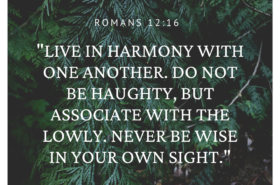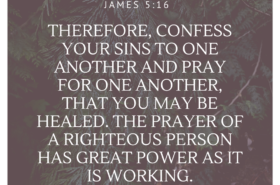
“Life sucks, and then you die.”
I’m not sure who said that or where I heard it, but if I’m honest with myself, many times that statement has resonated with me. In its crudeness, it expresses a certain truth: we will eventually reach the end of our physical life on earth, and we will most definitely experience pain before we get there.
I’ve personally always struggled with God’s sense of justice in relation to pain. My last 5 years alone have seen starvation, sexual and emotional abuse, and pieces of the grooming process by which one man purposed to sell me as a sex slave. These large and impactful moments of pain were (and still are) tough enough, but the pain has not been relegated to one season of life. Those things are behind me, and now I deal with a new trial: a painful chronic digestive disorder that derails any reliability on myself or my schedule. Even while writing this, I am suffering its undiagnosed effects. So how do we deal with this pain when it seems to come at us from all sides?
Some people run toward God in the wake of a tragedy. When something is taken from them, be it a friendship, a freedom, or a provision, they turn to God to fill the void left by said tragedy. But when everything is going well and all needs are met, this type can easily forget from whom these blessings flow, resulting in a tendency to leave pride and self-sufficiency unchecked.
However, there is a second group that seems to approach tragedy in the opposite manner. They are very thankful for and aware of God’s blessings and presence when everything is going well, but they can become indignant and self-reliant when circumstances turn south. This is where I fall. I have a humble spirit when I am focused on God’s blessings, knowing I don’t deserve everything he has given me. In those pesky times of pain, though, my desire to be judge, jury, and executioner rears its ugly head.
My initial reaction to unfortunate circumstances in my life also happens to be a common phrase uttered by a 3-year-old: “That’s not fair!” Or, if you prefer, the slightly more grown-up version dipped in a hefty coat of sarcasm: “How is this supposed to be used for your glory, God?” And when I’ve expressed such feelings to friends, I’ve received well-meaning, but insufficient answers, such as “Well, technically, we’re all so sinful that none of us even deserves one blessing from God – so be thankful that you’re not suffering with _______ as well!” or “God has a wonderful plan for this – rejoice in it!” Though both true, the first gives no healing or hope to the current state of the receiver, and the second is dismissive of the emotional complexity of the present in favor of focusing on a future happier outcome.
So what, then? Just power through it until God redeems it at some later point? Thank God that I’m not being burned at the stake right now instead? I can tell you with certainty that I have not yet fully attained this, but (spoiler alert!) the answer involves laying down my sense of what is fair in favor of resting in God’s justice and provision.
My Fairness and God’s Justice
The immediate emotional response of grasping for fairness is rooted in an underlying belief in my own ability to determine fairness, and from fairness, justice. Fairness, from man’s perspective, starts by looking at others and comparing them to oneself. So from my point of view, I am the standard to which everyone else is measured up against. If they struggle with obvious sin that I don’t deal with, I conclude that I deserve less pain and misfortune in my life than they do. After all, I am more righteous than they. If they don’t seem to have any sin issues and they make me look like a filthy person, I either assume they’re hiding something and make negative projections about their character, or I throw that sample out as an outlier and don’t use them for comparison in the future. The comparative approach to justice is an echo of the question that has rested on human hearts since our creation: why do bad things happen to good people? And why do good things happen to bad people? This is the extremely self-centered assumption from which many of my split-second emotional reactions stem: I do not deserve this pain, because look at them over there.
Justice and fairness from man’s perspective are synonymous. In fact, the dictionary defines unfair as “not based on…the principles of…justice” and unjust as “not based on…what is morally right and fair”. For example, if my coworker sidesteps corporate policy in order to produce the same metrics I do, it would be both unfair and unjust for them to receive a bigger raise than I receive. As an extension of that thought, if my life is more righteous than my coworker’s, I should not be dealing with chronic pain while they bask on a beach in the Bahamas.
However, God does not define justice by comparing one man to another. God’s justice is rooted entirely in his perfect holiness. Relative comparison between man to man is useless, as every man has fallen short of God’s standard (Romans 3:23). God’s justice leaves no room for comparison. In fact, it abolishes it. (Matthew 20:1-16). God’s justice is concerned with far greater than perceived levels of ‘goodness’ among men (Luke 18:9-14). And the toughest part for me to trust in my finite mind: God’s justice is complete and all-sufficient, whether or not I see that justice come to pass (Ecclesiastes 3:17, Romans 12:19, Isaiah 51:4-5).
To define whether or not God is just by whether or not my circumstances seem fair to me is an incredibly prideful endeavor. It is dethroning God’s justice and inserting my own standards into that judgement seat. As a sinful, finite being, that is absolutely not my place. Job was backhanded into reality by both Elihu and God himself after his stunt proclaiming to God how undeserving he was of all of the pain he went through. (Job 29-40, 33:8-12, 35:2) Check out God’s response to him in particular (Job 40:8-14). Ouch! But definitely a needed reminder.
Even as God is willing to bring to light his authority for justice, he is even more willing to meet me in my pain and gently remind me of his nature. When I shift my eyes from my misguided sense of justice to our wholly just God, I can rejoice that from him my desire for justice was born and in him my desire for justice is satisfied. Even now. In the most beautiful display of both mercy and justice in history, God fully punished sin at the cross (yay!) while fully redeeming me in his resurrection (nothing short of a miracle!). If God never dealt with the overall problem of sin (from which pain stems), how could I trust him to act justly in my life? I can take great comfort that because of his justice, sin and pain are on their way out.
[bctt tweet=”When I shift my eyes from my sense of justice to our wholly just God, I can rejoice that from him my desire for justice was born and in him desire for justice is satisfied.” username=”emmurbs”]
But until then, pain will happen. I am currently experiencing a fair bit of it. And the biggest battle in my heart is to deflate my own faulty sense of justice and inflate God’s all-sufficiency by resting in his promise to make all things new (Revelation 21:1-8). I may not have answers now. I may not ever see my abuser imprisoned or my body healed of its chronic conditions here on this earth. But this isn’t all. I have a concrete hope in the beautiful glory of God, and have peace in the promise that he will grant my weary heart rest in his justice. And in that, I can lay my pride down.


